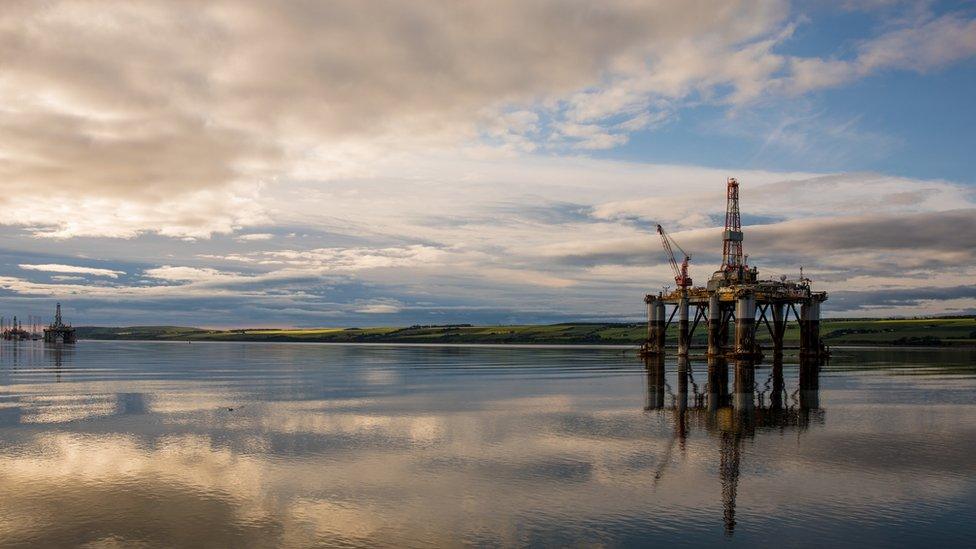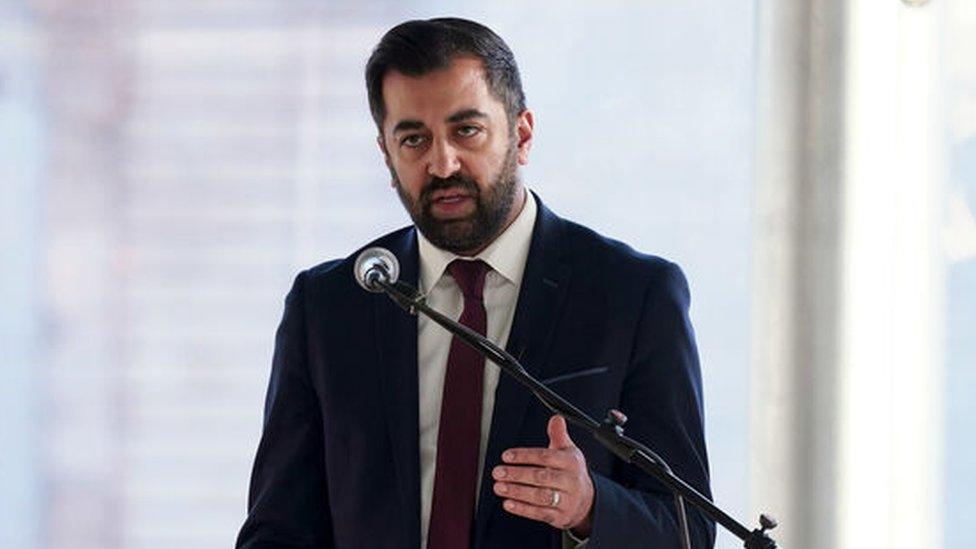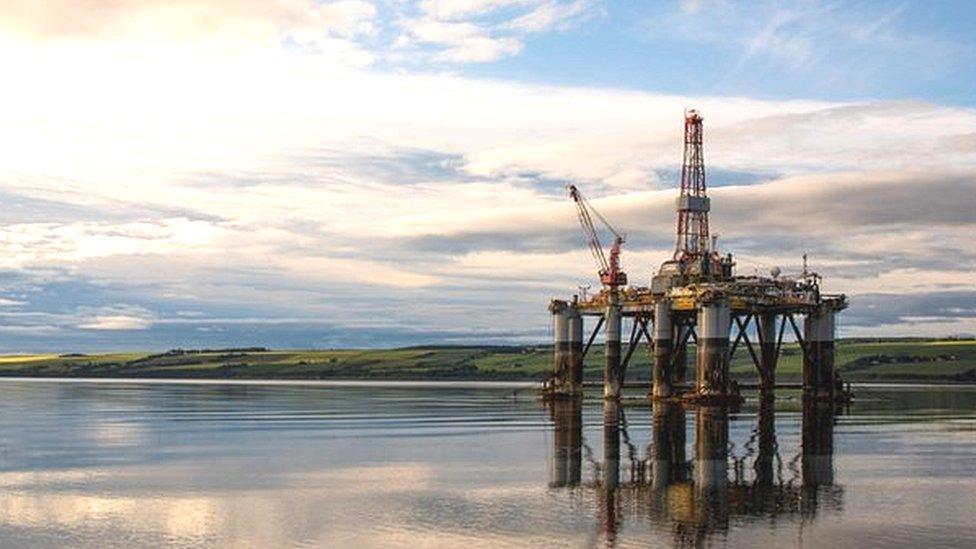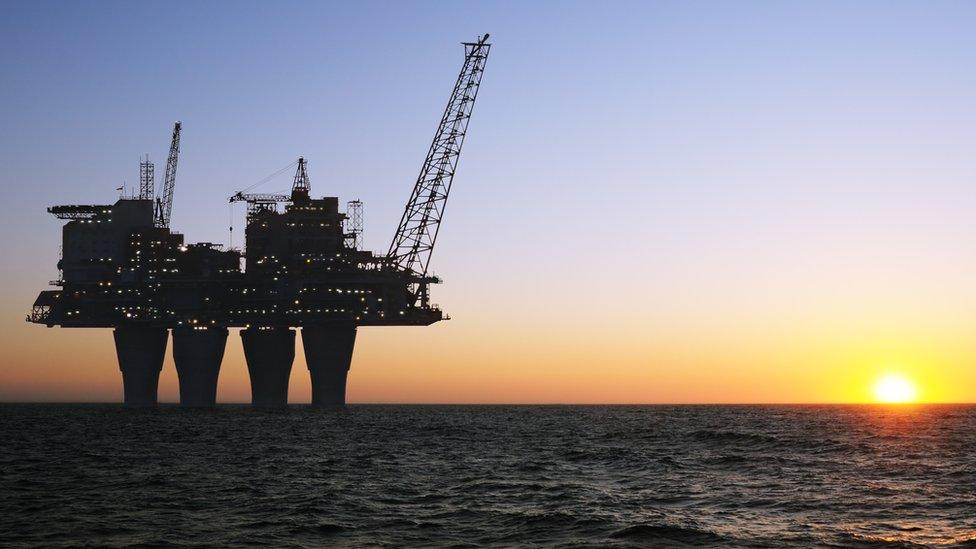Rishi Sunak refuses to be drawn over windfall tax plans
- Published
Rishi Sunak refused to be drawn on government plans for the windfall tax
Rishi Sunak has refused to say whether his government plans to raise or extend the windfall tax on energy firms.
Speaking to BBC Scotland News, the prime minister said it would not be appropriate for him to comment on fiscal matters ahead of the Budget.
Before addressing the Scottish Tory conference, he said the Conservatives were the only major party to support the North Sea oil and gas industry.
He also said he was "encouraged" by support for the Tories in Scotland.
Mr Sunak, who will be addressing the Scottish Conservatives' spring conference in Aberdeen on Friday afternoon, said: "We are going to need oil and gas for decades to come.
"I think the right thing to do is to focus on our resources here at home. That means supporting the North Sea, as we have done, because that's good for our energy security, good for our economy and good for British and Scottish jobs."
A windfall tax is used to target firms which benefit from something for which they were not responsible.
For example, energy firm profits soared because of rising demand after Covid restrictions were lifted and again when Russia's invasion of Ukraine boosted energy prices.
The levy was introduced in 2022 to help fund a scheme to lower energy bills for households and businesses and applies to profits made from extracting UK oil and gas.

Oil and gas companies working in the UK have been subject to a windfall tax.
In June 2023, the UK government announced that the windfall tax would be scrapped if prices fell to normal levels for a sustained period.
Halting the windfall tax would cut the overall tax rate on energy firms from 75% to 40%.
Mr Sunak said those working in the oil and gas industry would play an important part in the transition to clean energy.
"The workers in the industry have incredible skills and talent that can be used for the new industries like carbon capture and storage," he said. "Scotland is going to be an important part of that transition.
"The choice we have is should we focus on the resources here at home and issue new licences as we have done in the North Sea? Or should we be reliant on foreign regimes, which is not only bad for security but is bad for emissions as that energy has to be shipped here with three to four times the emissions from half way round the world?
"It just doesn't make any sense."

How does the windfall tax work?
Prime Minister Rishi Sunak introduced the Energy Profits Levy, external in May 2022 when he was chancellor, with the rate set at 25%.
That autumn, current Chancellor Jeremy Hunt announced it would increase to 35% from January 2023.
The levy applies to profits made from extracting UK oil and gas, but not from other activities - such as refining oil and selling petrol and diesel on forecourts.
Oil and gas firms operating in the North Sea already pay 30% corporation tax on their profits and a supplementary 10% rate on top of that.

When asked why the Conservatives had not won a general election in Scotland since 1955, the prime minster said: "What I'm focusing on doing is making sure we can offer the people of Scotland the peace of mind that there's a bright future ahead of them."
He said he was "incredibly encouraged" by what he was hearing and seeing on the ground while in Scotland, adding that the Conservatives in Scotland had done well in recent council by-elections.
"Our message is resonating and that's a message where we're investing in Scotland - freeports attracting jobs and investment, levelling-up funds in local communities, whether it's Peterhead or Aberdeen city centre or the Fair Isle ferry - but also staunch support for the North Sea energy industry here."
Mr Sunak also highlighted what he described as a "significant tax cut" the UK government brought in at the start of the year for everyone in work in Scotland.
He added that, in contrast, the SNP government had made Scotland the highest taxed part of the UK.
"I am confident we will increase the number of seats at the next general election in Scotland and that's because our message is resonating," he said.
"The Scottish Conservatives, led by Douglas, are doing a fantastic job of holding the SNP government to account for their failure on public services and highlighting the good work that the UK government is doing in Scotland."
- Published19 February 2024

- Published22 October 2024

- Published9 June 2023
